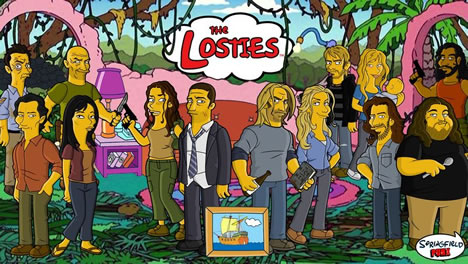What are the criticisms of the text?
What have fans produced after watching the text?
Awards
Lost has won a total of 57 awards with 251 nominations. Some of the awards won include:
- Emmy Award for Outstanding Drama Series
- J. J. Abrams was awarded an Emmy in September in 2005 for his work as director of "Pilot"
- Writers Guild of America Awards 2005 for Outstanding Achievement in Writing for a Dramatic Television Series
- 2005 Producers Guild Award for Best Production
- 2005 Director's Guild Award for Best Direction of a Dramatic Television Programme
- Screen Actors Guild Award 2005 for Best Ensemble Cast
- Golden Globe for Best Television Drama Series in 2006
- Jorge Garcia and Michelle Rodriguez won ALMA Awards for Best Supporting Actor and Actress in a television series in 2006
- Saturn Award for Best Television Series in 2005 and 2006
- Terry O'Quinn won a Saturn Award for Best Supporting Actor in a television series in 2005 and 2006
- Matthew Fox won Best Lead Actor in the Saturn Awards 2006
- Lost won consecutive Television Critics Association Awards for Outstanding Achievement in Drama for the 1st and 2nd seasons
- 2005 and 2006 Visual Effects Society Award for Outstanding Supporting Visual Effects in a Broadcast Programme
- Young Artist Award for Malcolm David Kelley for his performance as Walt in 2006
- 2005 Entertainment Weekly's Entertainer of the Year
- 2005 Prism Award for Charlie's drug storyline in the episodes "Pilot", "House of the Rising Sun" and "The Moth"
- In 2007 Lost was listed as one of Time magazine's "100 Best TV Shows of All-TIME"
- In June 2007 Lost won Best Drama award at the Monte Carlo Television Festival
- Terry O'Quinn won an Emmy Award for Outstanding Supporting Actor in a Drama Series in September 2007
- In 2009 Michael Emerson won the Outstanding Supporting Actor in a Drama Series at the 61st Primetime Emmy Awards
Criticisms
As the series' of the show continued, the show got a lot of criticism. With its audience criticising the lack of information about the characters, in addition to the long drawn out enigma codes, which took multiple episodes and in cases series' to answer.
"After the first season, many viewers of the show began to grow tired of the flashbacks. They were perceived by some to be repetitive and recycling information we were already aware of; flashbacks have gotten less important than they were in the first season, taking away from the on-island story lines. The producers have found new ways to make flashbacks interesting, such as flashbacks of on-island incidents, both before and during the main protagonists time on the island and, from the end of season 3 onwards, flash forwards." - www.lostpedia.wikia.com
"Many complain that Lost moved too slowly and there is a lack of answers in the show. This has turned many people off, even Lost fans over time. Typically, Season Two of Lost has been under fire the most for having little or no action in most episodes. The season three premiere had twenty percent less viewers than the season two premiere, and many critics worried that the producers were just making it up as they went along." - www.lostpedia.wikia.com
"After the first season, many viewers of the show began to grow tired of the flashbacks. They were perceived by some to be repetitive and recycling information we were already aware of; flashbacks have gotten less important than they were in the first season, taking away from the on-island story lines. The producers have found new ways to make flashbacks interesting, such as flashbacks of on-island incidents, both before and during the main protagonists time on the island and, from the end of season 3 onwards, flash forwards." - www.lostpedia.wikia.com
"Many complain that Lost moved too slowly and there is a lack of answers in the show. This has turned many people off, even Lost fans over time. Typically, Season Two of Lost has been under fire the most for having little or no action in most episodes. The season three premiere had twenty percent less viewers than the season two premiere, and many critics worried that the producers were just making it up as they went along." - www.lostpedia.wikia.com
"There's been a pervading sense that the creators really don't know what the hell is going on, and they're just as surprised to find out whats happening as the audience is." - Steven Simunic, critic
"ABC's 'Lost' has lost nearly half its live audience - more than 10 million people - from the days it was a sensation." - CNN.com
 What have fans produced?
What have fans produced?The Lost fan base created an online website, Lostpedia (www.lostpedia.wikia.com). The site allows fans of the show to share and view information and reviews about the show, characters and episodes. In addition to a forum, where an account can be created and fans can talk to each other online, sharing their predictions and views of the show. Photos and videos can also be uploaded and seen/watched, in addition to transcripts from each episode. All of these features have resulted in an online community of Lost fans to gain information, discuss the show and post their views. This could be classed as escapism of the uses and gratifications model, as the fans can divert their attention towards the site.
Here is an extract from the website's 'About us' page: "100 Million Fans Strong and ranked a Top 10 Social Network by Nielsen, Wikia operates the world's largest network of collaboratively published games, entertainment, and lifestyle content on the web. Our knowledgeable and devoted fans created hundreds of wikias every day on a trusted and customisable platform designed to help people share what they know and love".
